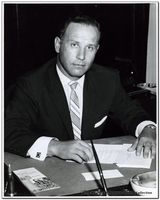
Union leader Miles Clark Stanley (October 2, 1924-May 3, 1974) was one of the notable figures in 20th-century West Virginia labor history. Born in Dunbar, Stanley began his career as a machinist. After serving in the army artillery in World War II, he became a steelworker. He rose rapidly in his local union, where he was elected president in 1947. In 1954, Stanley was elected president of the Kanawha Valley Industrial Council, and three years later he was selected the first president of the West Virginia Labor Federation AFL-CIO, a position he held until his untimely death at age 49.
Recognizing the critical need for work force development in the region, Stanley organized in 1964 the AFL-CIO Appalachian Council to conduct manpower training programs in the 12 Appalachian states. In 1965, Stanley was selected as personal assistant to AFL-CIO President George Meany. In that capacity Stanley organized a federation of labor for the state of Hawaii and was adviser to the International Labor Federation. Stanley served in Washington with the national union before returning to West Virginia in 1967. He retained his position as West Virginia AFL-CIO president throughout. He was credited with making the West Virginia AFL-CIO one of the most influential political forces in the state. Acknowledged as a champion of human rights, Stanley was an adviser to the U.S. Civil Rights Commission.
The state headquarters building of the West Virginia AFL-CIO is named in Stanley’s honor.
This Article was written by Fred A. Barkey
Last Revised on December 08, 2015
Related Articles
Cite This Article
Barkey, Fred A. "Miles Stanley." e-WV: The West Virginia Encyclopedia. 08 December 2015. Web. 26 July 2024.


Comments?
There aren't any comments for this article yet.
Click here to read and contribute to the discussion →